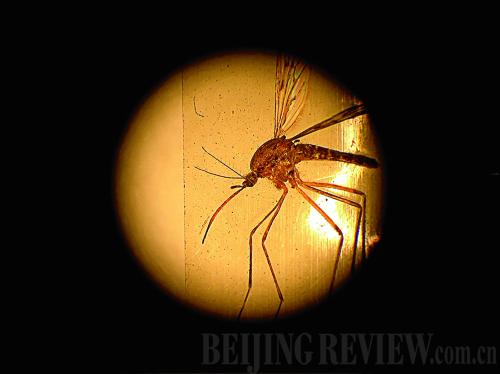|

A malaria-free Africa? It might just happen. A newly opened laboratory at Mali's University of Bamako is in the process of engineering mosquitoes that will be able resist malaria. Focused on breeding genetically modified (GM) mosquitoes over the next three years, the Malaria Research and Training Center is expected to complete a first batch of the insects sometime in 2011.
The research is possible due to a $1.8 million grant from the Wellcome Trust, a charity based in the United Kingdom. Faculty at the UK's Keele University are also involved in the research being conducted at the University of Bamako's laboratory, having trained a number of the center's scientists prior to its opening. The insects' viability will be tested at a field station in a nearby village.
It is hoped that these GM mosquitoes in the future will overtake wild mosquito populations in Mali and elsewhere, wiping out malaria. But the science behind genetically modifying organisms is hampered by issues of uncertainty and ethics. There is no way to anticipate the possible ecological impact – positive or negative – of releasing a GM breed of mosquito into the wild, say critics of Bamako's program.
Currently, Mali is working in tandem with the World Health Organization (WHO) to develop national legislation geared toward GM insects and biosafety. And while an ethics committee at the University of Bamako has given its stamp of approval on the research being conducted at the Malaria Research and Training Center, the prospect of GM mosquitoes moving beyond state borders once released into the wild has yet to be addressed. Members of the scientific community are pushing for guidelines at multinational and regional levels. At present, no such regulations exist in the world outside a select few international treaties.
Malaria vaccines may be a less-fraught alternative to the swirl of issues surrounding GM insects. The WHO cites effective vaccines as one of the most important methods of malaria prevention, although none exist as of yet. There are 19 serious pre-clinical vaccine projects in operation this year, according to the organization'sMalaria Vaccine Rainbow Tables, a set of data compiled for the WHO's Initiative for Vaccine Research.
Vaccines and GM mosquitoes can be both classified as "new types of intervention" – measures needed if malaria is to be eliminated according to new intervention models. Both would, if successful, be broader in reach than the current methods of indoor spraying of insecticides, insecticide-treated bednets and the drug artemisinin used to treat malaria. (There is troubling evidence that malarial parasites have developed resistance to artemisinin. The WHO has discouraged use of the drug as a result.) Those involved in the battle against malaria will be watching closely to see what happens with both vaccine research efforts and the GM malaria-resistant mosquitoes being reared at the University of Bamako.
Tech Bytes
➲ A study has found that emodin, a product derived from natural Chinese herbs, could play a significant role in curbing the impact of type 2 diabetes. The study showed that giving emodin to mice with obesity lowered their blood glucose and serum insulin, as well as improving insulin resistance and leading to more healthy levels of lipids in the blood. The study, by the Shanghai Institute of Materia Medica, was published in the British Journal of Pharmacology.
➲ China's first jet plane in line with international airworthiness standards took a big step forward in August when it successfully completed high-temperature and high-humidity tests. The ARJ21-700, independently developed by the AVIC Commercial Aircraft Co., flew from Yanliang in Shaanxi Province to Sanya in the island province of Hainan. It is designed for regional flights in extreme temperatures and has a range of 2,225 km.
➲ Researchers at Stellenbosch University in South Africa have come up with a revolutionary new "tea bag" that purifies water on a small scale. The sachet is made from the same material that is used for rooibis tea bags, but the inside contains ultra-thin nanoscale fibers, which filter contaminants, and active carbon granules, which kill bacteria. When fitted into the neck of a water bottle, it sucks up toxic contamination.
|